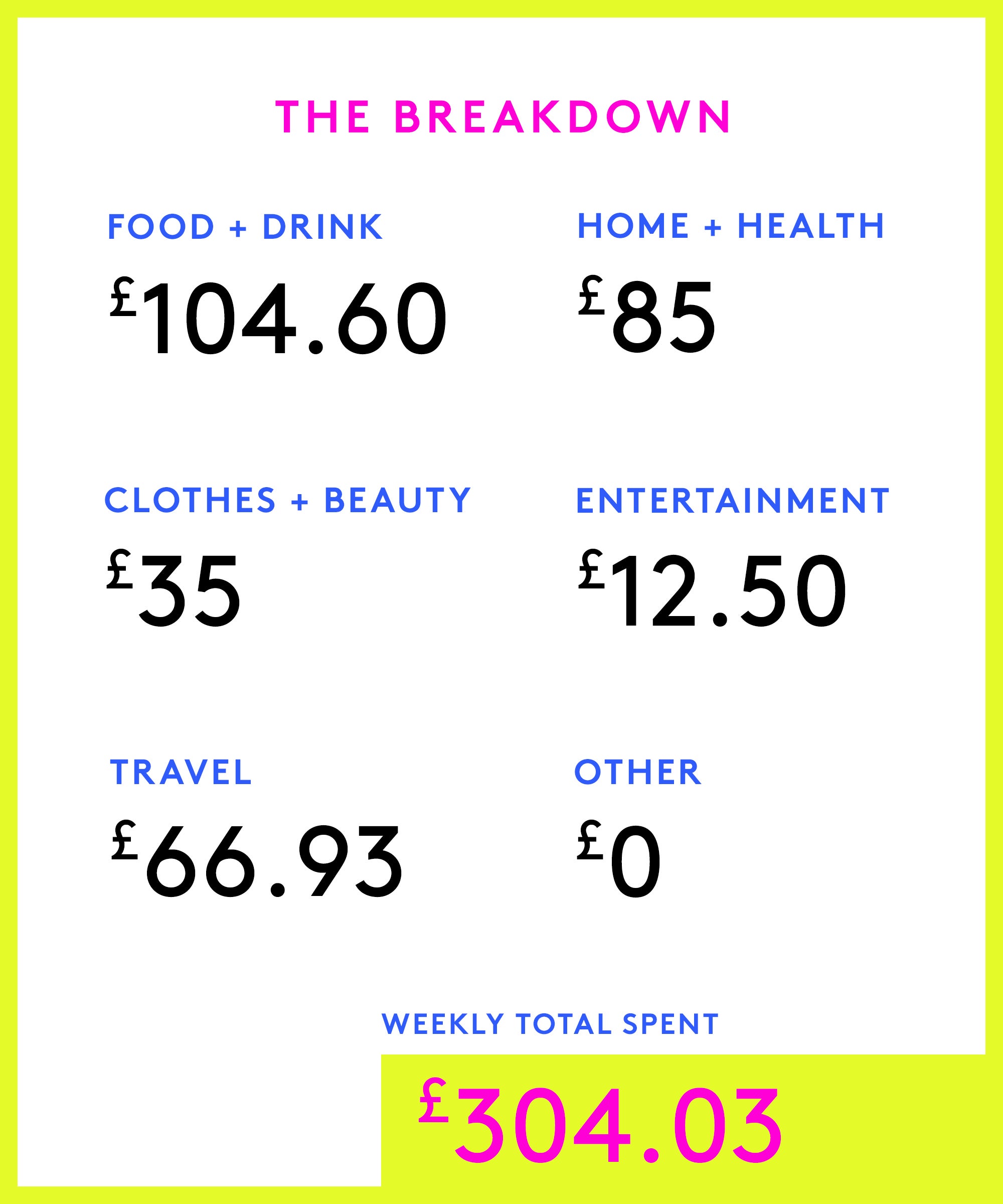This week: “I’m a 29-year-old consultant living in London. Me and my long-term partner broke up earlier this year and I decided to move into a one-bed flat rather than a house share. This means my housing costs are at the maximum of what I can comfortably afford, but I love living alone so I’m really happy with my decision. I’m currently deciding what I want to do when the lease is up on my flat next year — given the economic environment, my future at my current job is very uncertain. I’m not sure what I want to do going forwards so I’m applying for jobs that I think I’d enjoy but I am seriously considering a big change up such as moving cities, or even moving abroad.”
Occupation: Consultant
Industry: Risk
Age: 29
Location London
Salary £55,000
Paycheque Amount: £3,120
Number of housemates: 0.5 (my dog, K, lives with me part time)
Pronouns: She/her
Monthly Expenses
Housing costs: £1,325. This is the most I’ve ever paid for rent, by some distance.
Loan payments: I pay £192 in student loans.
Savings?: £30,000 in a Stocks and Shares ISA; £10,000 in a Help to Buy ISA; £14,000 in a regular savings account.
Pension?: I pay 3% and my employer pays in 5%.
Utilities: £75 electricity; £35 water; £26.50 internet. I pay council tax annually which is £928 (including 25% single occupancy discount).
All other monthly payments: £8 phone; £5 charity; £39.99 Peloton membership.
Subscriptions: £7 Netflix; £10.99 Spotify; £0.99 Apple Storage. I also pay £66.32 for the The Atlantic annually.
Did you participate in any form of higher education? If yes, how did you pay for it?
I went to university and was awarded the maximum loan and grant. This didn’t cover my monthly outgoings, so I also worked part time as a waitress throughout my degree.
Growing up, what kind of conversations did you have about money?
Money wasn’t discussed in detail, though both my parents are good with money. They taught me to never spend more than you earn, and only have a credit card to get a good credit score rather than to supplement income. Once I reached the age of 16, if I wanted to buy anything I had to work to pay for it. This meant working all my evenings and weekends to afford driving lessons, car insurance and so on, which I really resented at the time, but I think gave me a good attitude to money. We have had more conversations as I have gotten older and we often discuss investing, tax and interest rates.
If you have, when did you move out of your parents’/guardians’ house?
When I was 18 for university.
At what age did you become financially responsible for yourself? Does anyone else cover any aspects of your financial life?
I became financially responsible for myself at 18.
What was your first job and why did you get it?
I started working in a hairdressers on a Saturday when I was 14 so I could spend money at Claire’s and Tammy Girl.
Do you worry about money now?
Yes, I do. I’m quite careful with money — I save religiously, and splurges only tend to be on holidays. I’m trying to be a bit more carefree as I attach a lot of guilt to spending which can feel really restrictive. Because I’ve chosen not to live in a house share, I’m saving much less than before which, although hopefully temporary, stresses me out.
Do you or have you ever received passive or inherited income?
I received some inheritance when I was 21. I used some of it for surgery which I paid for privately, some towards holidays, and the remainder formed the basis of a savings pot.

6:30 a.m. — K wakes me up, full of energy. I’m in the middle of a week off, so I try and convince her to settle in bed with me for a bit.
8 a.m. — Admit defeat and get up and take K out for a walk. I then get myself ready and make some porridge for breakfast.
9:15 a.m. — Catch the train for two stops, then walk the rest of the way to my ex-boyfriend’s house to drop K off. We got her when we were together so we share looking after her — I tend to have her for a few days every week but my ex has a bigger flat and a garden so she spends more time with him. It’s hard for lots of reasons and I don’t know many people in similar situations which can make it feel a bit isolating, but she’s the best thing in the world.
11:30 a.m. — I get the train back home and jump straight on a call with work that I can’t avoid.
2 p.m. — Walk to my local nail place to get a refresh. I only recently started getting them done regularly but I love how fancy I feel when I have them done, £35.
4 p.m. — Head home via Sainsbury’s to get some basics: milk, cornflakes, chocolate, gyoza, strawberries, cleaning sprays, £16.50.
5 p.m. — Stare at the ingredients in my fridge for a bit before deciding on cornflakes and a satsuma as I can’t be bothered to cook #girldinner.
6 p.m. — Spend the evening watching The Bold Type, with a G&T.
10 p.m. — TfL charge comes out, £5.30.
10:30 p.m. — Head to bed with a podcast.
Total: £56.80

8 a.m. — Alarm goes off and it feels like I’m being dragged out from the deepest sleep I’ve had in years.
9 a.m. — Head for the train to go to therapy. I do both in-person and online sessions, but as I’m off this week I decide to do in person, £85.
11 a.m. — Finish therapy, feeling both better and worse, which is often the case. Stop in for a coffee and croissant at the Gail’s nearby, £6.90.
12:20 p.m. — Catch the train back to meet my best friend E for a walk and a catch up. Get caught in a biblical-level rainstorm on the walk home. Of course, I haven’t worn a coat or got an umbrella so I get laughably soaked.
2:45 p.m. — I have a coffee in the bath to warm up, and then I scroll in bed for a while, before cleaning the flat and getting ready.
5:30 p.m. — Although it’s my week off, I head to some work drinks for someone who’s leaving. I have a mix of alcoholic and soft, and all drinks are expensed, thankfully.
10:30 p.m. — Drinks wrap up. I grab a chicken wrap from Leon at the train station on the way home as I’m absolutely ravenous, £6.99.
12 a.m. — Head to bed as soon as I get home. My TfL charge for the day comes out overnight, £9.60.
Total: £108.49

7 a.m. — I wake up early, probably due to the alcohol. I lay in bed listening to a podcast for an hour.
8 a.m. — It seems I won’t be getting the proper lie in I wanted, so I make a coffee and have some cornflakes in bed watching The Bold Type.
10:30am — I do a lane break workout on the Peloton to try and dust off the background hangover. I finish up with a 10 minute full-body stretch. I feel sweaty but good.
11:15 a.m. — I have an “everything” shower, do my skincare and apply gradual tan.
12:30 p.m. — I decide carbs are in order and make some pancetta and broccoli pasta in an attempt to use up some fridge leftovers.
2:40 p.m. — I make a tea to go, get the train and head to be a tourist at the National Portrait Gallery. The last time I went was on a school trip and I thought it was so dull. As an adult I want to see if I’m the kind of cultured lady I’ve always dreamed of being. Entry is free.
5 p.m. — I have the best couple of hours wandering round. Then I head home and get ready for my friend A’s 30th birthday dinner.
7:30 p.m. — Get the train to the restaurant and have the most amazing three-course meal, paired with wine, all kindly paid for by A. We head to a bar after for more drinks and a dance. I have a soda and lime, paid for by my friend E.
12:45 a.m. — I’ve missed the last train and don’t fancy getting the night bus so I get an Uber home, £14.98.
1:15 a.m. — Get into bed, feeling smug that I won’t have a hangover tomorrow. My TfL for the day comes to £9.60.
Total: £24.58

7:15 a.m. — My body clock wakes me up despite my hopes for a lie-in. I try to get back to sleep but I fail. I listen to a podcast and scroll TikTok.
8:45 a.m. — I get up, make a coffee and some porridge and put on some mindless TV.
10:50 a.m. — I decide to have a morning bath, which feels very luxurious. I watch Jury Duty while I’m in the tub — I know I’m late to the bandwagon but it is hilarious.
12:40 p.m. — I walk to the shops to get some food. I buy ingredients for spaghetti bolognese, greaseproof paper, oats, milk, frozen berries, dog chews, chocolate, pretzels and satsumas. The total comes to £30.18.
3 p.m. — I while away the afternoon flicking between reading and watching TV. I feel a bit lazy, but I can feel that my body needs a rest so I roll with it.
5:30 p.m. — I start prepping and cooking the spaghetti bolognese. It’s such a comforting meal and I really enjoy the process of cooking it. Fortunately I’ll have loads for leftovers, and it’ll only taste better with time.
6:30 p.m. — Once the bolognese has cooked on a low heat for a while, I serve it up with the rest of the red wine I didn’t use in the cooking. I feel like a fancy lady as I eat.
8:20 p.m. — I spend the evening watching yet more TV. I stop mid-way to melt some dark chocolate and drizzle over salted pretzels. I impatiently wait for the chocolate to set and then dive in.
11 p.m. — Get into bed and listen to a true crime podcast to soothe me to sleep.
Total: £30.18

7:15 a.m. — I get up early and get ready to go to my mum’s house for a very wholesome day making apple juice.
8:15 a.m. — Arrive at the train station. I’m still clinging onto my 26 to 30 railcard so the return ticket is a (relative) bargain at £9.55.
8:30 a.m. — I buy a coffee at the Costa on the platform as I ran out of coffee at home, £2.60.
10:20 a.m. — Arrive, and immediately get to work chopping literally hundreds of apples. I catch up with everyone as we work, and the sun is shining. It’s a lovely way to spend the morning.
12:30 p.m. — We stop for lunch. Mum has made sausage sandwiches which are 10/10, and much needed.
1:15 p.m. — Back to chopping the last few apples. They’re fed into the juicer before we bottle it. Obviously we taste test as we go and it’s delicious.
3:30 p.m. — We finally finish and have a tea, feeling proud of our hard work. I’ve chopped so many apples I have a blister. Totally worth it.
4:10 p.m. — I head for my train home, loaded up with juice and other homegrown things including walnuts, honey and eggs. Countryside living is very different from London!
6:30 p.m. — Embarrassingly, I get stuck at the gates at the train station as my ticket doesn’t work and there is no one in sight to help. Eventually someone shows up and lets me through, just as I’m about to touch out with contactless and have to pay the maximum fare.
7:20 p.m. — I scroll on TikTok while eating some leftover pasta.
7:45 p.m. — Put the rugby on and valiantly try to ignore the Sunday scaries that are creeping in. I’m missing K a lot today, and it’s still a few days until I see her.
10:45 p.m. — Get into bed to read my book, Clytemnestra, which I’m really enjoying.
Total: £12.15

7:45 a.m. — Wake up, and get straight on the Peloton for a 20-minute workout.
8:15 a.m. — Shower, get ready and have a coffee before starting the day.
9 a.m. — Sit down at my laptop and start going through emails from when I was off.
10 a.m. — Make some porridge and call HMRC as my tax code has changed twice recently and I am either paying loads in tax or nothing which is very annoying. Wait 45 minutes on hold only to be told that someone will have to call me back within five working days. Brilliant.
12:30 p.m. — Stop for lunch which consists of pita and hummus, and some of the fresh apple juice.
2 p.m. — I see a book I’ve been wanting is on sale so I order it, £12.50.
5 p.m. — I spend the rest of the afternoon in meetings, before changing out of my very casual work from home outfit (read: pyjamas) into actual clothes.
6 p.m. — Get the train into central and meet my friend S at the pub. We used to work together, and he rarely comes into London anymore so we don’t get to catch up very often. We have three rounds, I pay for two which comes to £23.70.
9:30 p.m. — Given the obvious and silly lack of dinner I’m feeling the effects of the wine slightly more than is ideal. I duck into Leon at the station and get a burger and waffle fries, which is not as delicious as I hoped, £11.48.
11 p.m. — Collapse into bed after chugging a bunch of water and hope for the best. My TfL charges come out overnight, £8.30.
Total: £55.98

7:15 a.m. — After a bit of a fitful sleep, I wake up and force myself to get ready and go to the office. I have a big to-do list and I am much more productive there than at home.
9 a.m. — Train in, and I arrive to an empty office. I immediately get a coffee and some cereal (both office provided).
11:15 a.m. — After spending the morning editing some reports for different clients, I head out to get an early lunch courtesy of the vague hangover that is encroaching. I get a sandwich, crisps and flapjack from M&S, £6.25.
1:30 p.m. — Regret the early lunch.
3:30 p.m. — I spend the afternoon writing the outline of a lengthy risk assessment for a client about deepfakes and the possible impact of them on their business. A lot of clients are getting more and more concerned about the growth of AI and I find it a really interesting topic.
4:10 p.m. — I catch the train home a bit early so I can take a couple of meetings from there with fewer distractions.
6:15 p.m. — My meetings are finally done so I walk through the park to my friend E’s house.
8 p.m. — She cooks a lovely gnocchi dish for us and we watch Skandal! Bringing Down Wirecard on Netflix which is good, but we are both confused.
10:15 p.m. — I catch a bus home as I don’t want to walk through the park late at night and the other route takes ages. It doesn’t take long and I’m quickly back home.
11 p.m. — I take my makeup off, do my skincare, and get into bed for a long sleep. My TfL charge for the day comes to £9.60.
Total: £15.85

Food & Drink: £104.60
Clothes & Beauty: £35
Home & Health: £85
Entertainment: £12.50
Travel: £66.93
Other: £0
Total: £304.03
Conclusion
“This is pretty much what I expected. Having been mindful of my spending for a few years, food and commute costs are consistently my biggest expenses. In both areas I could cut down, either by planning food shops better or attaching my railcard to my Oyster, which I’ve been meaning to do for ages. Given my future is currently very uncertain, I’m trying to find a good balance between socialising and saving. I’m really enjoying being single and living alone, even if it means I’m paying the ‘single tax’ in London for housing and bills and I will continue to prioritise that.”
Like what you see? How about some more R29 goodness, right here?
Money Diary: An Art Studio Manager On £55,000